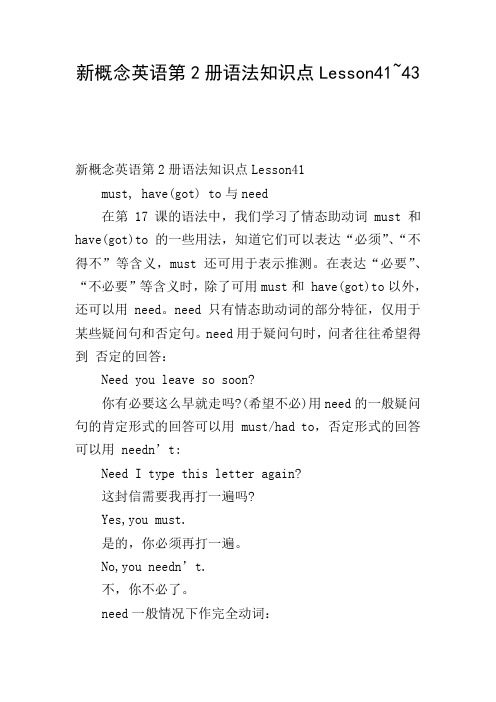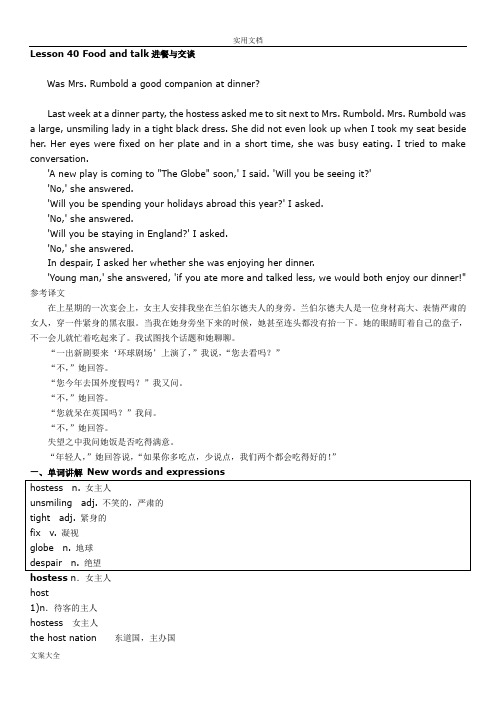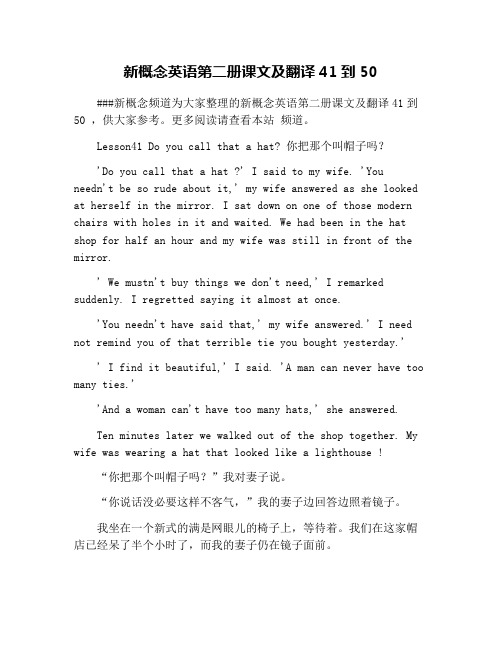新概念第二册课文翻译及学习笔记【Lesson40、41、42】
- 格式:docx
- 大小:43.51 KB
- 文档页数:14

新概念英语第2册语法知识点Lesson41~43新概念英语第2册语法知识点Lesson41must, have(got) to与need在第17课的语法中,我们学习了情态助动词must和have(got)to 的一些用法,知道它们可以表达“必须”、“不得不”等含义,must还可用于表示推测。
在表达“必要”、“不必要”等含义时,除了可用must和 have(got)to以外,还可以用need。
need只有情态助动词的部分特征,仅用于某些疑问句和否定句。
need用于疑问句时,问者往往希望得到否定的回答:Need you leave so soon?你有必要这么早就走吗?(希望不必)用need的一般疑问句的肯定形式的回答可以用 must/had to,否定形式的回答可以用 needn’t:Need I type this letter again?这封信需要我再打一遍吗?Yes,you must.是的,你必须再打一遍。
No,you needn’t.不,你不必了。
need一般情况下作完全动词:I need to go to the dentist this morning.今天上午我需要去看牙。
表示必要时,must的语气比need要强:I must go to the dentist this morning.今天上午我必须去看牙。
用must的一般疑问句可以用must/have to或needn’t来回答,而不用 mustn’t:Must I set off now?我现在必须出发吗?Yes,you must / have to.是的,你现在必须/得出发。
No,you needn’t.不,你不必。
“不必要”可用 needn’t, don’t have to来表示:You needn’t/don’t have to work such long hours.你不必工作那么长时间。
这种句型可用来表示说话人让对方选择或允许对方可以不做某事的主观意图。

新概念英语第二册:第40课课文详解及语法解析新概念英语第二册:第40课课文详解及语法解析课文详注 Further notes on the text1.next to, 挨着。
它既能够表示座位挨着也能够表示地理位置上挨着:Who was the man sitting next to you during the meeting?开会时坐在你旁边的那人是谁?There's a field/shop next to our house.我们家房子边上有一片田野/一个商店。
2.Mrs. Rumbold was a large, unsmiling lady in a tight black dress.兰伯尔德夫人是一位身材高大、表情严肃的女人,穿一件紧身的黑衣服。
(1)unsmiling的反义词为smiling(微笑的,喜气洋洋的)。
有些形容词前面能够加上前缀un-来表示相反的意义:comfortable (舒服的)/uncomfortable(不舒服的),true(真实的)/untrue(不真实的),interesting(有趣的)/uninteresting(无趣味的,乏味的)。
(2)in在这里表示“穿着”、“戴着”:A young man in a blue dress is inquiring for you.有位穿蓝衣服的小伙子在找您。
3.take one's seat, 在指定的位置上就座。
take a seat表示“坐下”,比sit要正式:Please take a seat.请坐。
take one's seat则表示位置事先已安排好:After everyone had taken his seat, the meeting/dinner party began.大家各自就座后,会议/宴会便开始了。
4.Her eyes were fixed on her plate and in a short time, she was busy eating. 她的眼睛盯着自己的盘子,不一会儿就忙着吃起来了。

新概念英语2逐句精讲Lesson40~42新概念英语2逐句精讲Lesson401. Last week at a dinner party, the hostess asked me to sit next to Mrs. Rumbold.在上星期一次宴会上,女主人安排我坐在了兰伯尔德夫人的身旁。
语言点1 cocktail party 鸡尾酒会birthday party 生日聚会tea party 茶话会dinner party 宴会evening party 晚会garden party 游园会weekend party 周末晚会Christmas party 圣诞晚会语言点2 sit next to sb.坐在某人的旁边,相当于sit close to sb2. Mrs. Rumbold was a large, unsmiling lady in a tight black dress.兰伯尔德夫人是一位身材高大、表情严肃的女人,穿着一件紧身的黑衣服。
语言点1 large 和 unsmiling两个形容词修饰lady,作前置定语,而 in a tight black dress则是介词短语作后置定语修饰lady。
语言点2 修饰男人“胖”的词汇:strong,heavy,sturdy;修饰女人“胖”的词汇:large,plump。
3. She did not even look up when I took my seat beside her.当我在她旁边坐下时,她甚至连头都没有抬一下。
语言点 look up意为“向上看”,请参考Lesson 15课文分析。
4. Her eyes were fixed on her plate and in a short time, she was busy eating.她的眼睛盯着她的盘子,不一会儿就忙着吃起来了。
语言点1 fix on = stare at = gaze at = focus on 盯着语言点2 busy表达某人忙于做某事时,常用以下两种表达:1) be busy doing sth.I am busy preparing supper.我正在忙着准备晚饭。

新概念英语第二册Lesson40~42课文注释新概念英语第二册Lesson40课文注释1.next to, 挨着。
它既可以表示座位挨着也可以表示地理位置上挨着:Who was the man sitting next to you during the meeting?开会时坐在你旁边的那人是谁?There's a field/shop next to our house.我们家房子边上有一片田野/一个商店。
2.Mrs. Rumbold was a large, unsmiling lady in a tight black dress.兰伯尔德夫人是一位身材高大、表情严肃的女人,穿一件紧身的黑衣服。
(1)unsmiling的反义词为smiling(微笑的,喜气洋洋的)。
有些形容词前面可以加上前缀un-来表示相反的意义:comfortable (舒服的)/uncomfortable(不舒服的),true(真实的)/untrue(不真实的), interesting(有趣的)/uninteresting(无趣味的,乏味的)。
(2)in在这里表示“穿着”、“戴着”:A young man in a blue dress is inquiring for you.有位穿蓝衣服的小伙子在找您。
3.take one's seat, 在指定的位置上就座。
take a seat表示“坐下”,比sit要正式:Please take a seat.请坐。
take one's seat则表示位置事先已安排好:After everyone had taken his seat, the meeting/dinner party began.大家各自就座后,会议/宴会便开始了。
4.Her eyes were fixed on her plate and in a short time, she was busy eating. 她的眼睛盯着自己的盘子,不一会儿就忙着吃起来了。

Lesson 40 Food and talk进餐与交谈Was Mrs. Rumbold a good companion at dinner?Last week at a dinner party, the hostess asked me to sit next to Mrs. Rumbold. Mrs. Rumbold was a large, unsmiling lady in a tight black dress. She did not even look up when I took my seat beside her. Her eyes were fixed on her plate and in a short time, she was busy eating. I tried to make conversation.'A new play is coming to "The Globe" soon,' I said. 'Will you be seeing it?''No,' she answered.'Will you be spending your holidays abroad this year?' I asked.'No,' she answered.'Will you be staying in England?' I asked.'No,' she answered.In despair, I asked her whether she was enjoying her dinner.'Young man,' she answered, 'if you ate more and talked less, we would both enjoy our dinner!" 参考译文在上星期的一次宴会上,女主人安排我坐在兰伯尔德夫人的身旁。

新概念英语第二册课文及翻译41到50###新概念频道为大家整理的新概念英语第二册课文及翻译41到50 ,供大家参考。
更多阅读请查看本站频道。
Lesson41 Do you call that a hat? 你把那个叫帽子吗?'Do you call that a hat ?' I said to my wife. 'Youneedn't be so rude about it,' my wife answered as she looked at herself in the mirror. I sat down on one of those modern chairs with holes in it and waited. We had been in the hat shop for half an hour and my wife was still in front of the mirror.' We mustn't buy things we don't need,' I remarked suddenly. I regretted saying it almost at once.'You needn't have said that,' my wife answered.' I need not remind you of that terrible tie you bought yesterday.'' I find it beautiful,' I said. 'A man can never have too many ties.''And a woman can't have too many hats,' she answered.Ten minutes later we walked out of the shop together. My wife was wearing a hat that looked like a lighthouse !“你把那个叫帽子吗?”我对妻子说。
新概念英语第二册Lesson40课文翻译及词汇【课文】First listen and then answer the question.听录音,然后回答以下问题。
Was Mrs. Rumbold a good companion at dinner?Last week at a dinner party, the hostess asked me to sit next to Mrs. Rumbold. Mrs. Rumbold was a large, unsmiling lady in a tight black dress. She did not even look up when I took my seat beside her. Her eyes were fixed on her plate and in a short time, she was busy eating. I tried to make conversation.'A new play is coming to "The Globe" soon,' I said. 'Will you be seeing it?''No,' she answered.'Will you be spending your holidays abroad this year?' I asked.'No,' she answered.'Will you be staying in England?' I asked.'No,' she answered.In despair, I asked her whether she was enjoying her dinner.'Young man,' she answered, 'if you ate more and talked less, we would both enjoy our dinner!"【课文翻译】在上星期的一次宴会上,女主人安排我坐在兰伯尔德夫人的身旁。
新概念英语第二册课程参考译文新概念英语第二册课程参考译文Lesson 44 Through the forest 穿过森林Mrs. Anne Sterling did not think of the risk she was taking when she ran through a forest after two men. They had rushed up to her while she was having a picnic at the edge of a forest with her children and tried to steal her handbag. In the struggle, the strap broke and, with the bag in their possession, both men started running through the trees. Mrs. Sterling got so angry that she ran after them. She was soon out of breath, but she continued to run. When she caught up with them, she saw that they had sat down and were going through the contents of the bag, so she ran straight at them. The men got such a fright that they dropped the bag and ran away. 'The strap needs mending,' said Mrs. Sterling later, 'but they did not steal anything.' 参考译文安.斯特林夫人在穿过森林追赶两个男人时,她并没有考虑到所冒的风险。
新概念英语第二册:第42课课文详解及语法解析-CAL-FENGHAI.-(YICAI)-Company One1新概念英语第二册:第42课课文详解及语法解析课文详注 Further notes on the text1.…we stopped at a square to have a rest.……我们在一个广场上停下来休息。
stop 后面跟不定式时,表示停下其他活动去做不定式表示的动作:On the way to the station, I stopped to buy a paper.在去车站的路上,我停下来买了张报纸。
stop后面如果跟动名词形式,则表示停止该动作:I've stopped buying newspapers我已不再买报纸了。
How can we stop him complaining?我们如何才能让他不抱怨呢?2.after a time, 过了一会儿,不久以后。
time在这里表示“(一段)时间”:He lived abroad for a long time.他在国外生活了很长时间。
I saw him a short time ago.我刚才还看见他了。
After a time, the dog stopped following me.过了一会儿,那条狗便不再跟着我了。
3.…we had our first glimpse of the snake. ……我们才第一次看到了那条蛇。
glimpse表示“一瞥”、“一看”,是可数名词,常用于下列短语中:have/ get a glimpse of, catch a glimpse of, take a glimpse at:He took a glimpse at the‘No Parking’signs outside Jasper's gate and parked his car there.他瞥了一眼贾斯珀家大门外边的那些“禁止停车”的牌子,然后把车停在了那里。
第⼆次修订完全版新概念英语第⼆册笔记pdf课全⽬录Lesson 1 A private conversation 私⼈谈话 (4)Lesson 2 Breakfast or lunch? 早餐还是午餐 (11)Lesson 3 Please send me a card 请给我寄⼀张明信⽚ (16)Lesson 4 An exciting trip 激动⼈⼼的旅⾏ (21)Lesson 5 No wrong numbers ⽆错号之虞 (25)Lesson 6 Percy Buttons 珀西.巴顿斯 (31)Lesson 7 Too late 为时太晚 (38)Lesson 8 The best and the worst最好的和最差的 (44)Lesson 9 A cold welcome 冷遇 (49)Lesson 10 Not for jazz不适于演奏爵⼠乐 (55)Lesson 11 One good turn deserves another礼尚往来 (60)Lesson 12 Goodbye and good luck 再见,⼀路顺风 (64)Lesson 13 The Greenwood Boys 绿林少年 (68)Lesson 14 Do you speak English? 你会讲英语吗? (74)Lesson 15 Good news 佳⾳ (80)Lesson 16 A polite request 彬彬有礼的要求 (85)Lesson 17 Always young 青春常驻 (90)Lesson 18 He often does this! 他经常⼲这种事! (96)Lesson 19 Sold out 票已售完 (99)Lesson 20 One man in a boat 独坐孤⾈ (104)Lesson 21 Mad or not? 是不是疯了? (110)Lesson 22 A glass envelope 玻璃信封 (115)Lesson 23 A new house 新居 (119)Lesson 24 It could be worse 不幸中之万幸 (122)Lesson 25 Do the English speak English? 英国⼈讲的是英语吗? (125)Lesson 26 The best art critics 最佳艺术评论家 (130)Lesson 27 A wet night ⾬夜 (136)Lesson 28 No parking 禁⽌停车 (143)Lesson 29 Taxi! 出租汽车! (149)Lesson 30 Football or polo?⾜球还是⽔球? (154)Lesson 31 Success story 成功者的故事 (159)Lesson 34 Quick work 破案“神速” (177)Lesson 35 Stop thief! 捉贼 (180)Lesson 36 Across the Channel 横渡海峡 (186)Lesson 37 The Olympic Games 奥林匹克运动会 (193)Lesson 38 Everything except the weather 唯独没有考虑到天⽓ (198) Lesson 39 Am I all right? 我是否痊愈? (203)Lesson 40 Food and talk 进餐与交谈 (208)Lesson 41 Do you call that a hat? 你把那个叫帽⼦吗? (213)Lesson 42 Not very musical 并⾮很懂⾳乐 (219)Lesson 43 Over the South Pole 飞越南极 (224)Lesson 44 Through the forest 穿过森林 (229)Lesson 45 A clear conscience 问⼼⽆愧 (234)Lesson 46 Expensive and uncomfortable 既昂贵⼜受罪 (238)Lesson 47 A thirsty ghost 嗜酒的⿁魂 (243)Lesson 48 Did you want to tell me something? 你想对我说什么吗? (247) Lesson 49 The end of a dream 美梦告终 (250)Lesson 50 Taken for a ride 乘车兜风 (256)Lesson 51 Reward for Virtue 对美德的奖赏 (262)Lesson 52 A pretty carpet 漂亮的地毯 (267)Lesson 53 Hot snake 触电的蛇 (272)Lesson 54 sticky fingers 粘糊的⼿指 (278)Lesson 55 Not a gold mine 并⾮⾦矿 (282)Lesson 56 Faster than sound! ⽐声⾳还快! (291)Lesson 57 Can I help you, madam? 您要买什么,夫⼈? (298)Lesson 58 A blessing in disguise? 是因祸得福吗? (305)Lesson 59 In or out? 进来还是出去? (311)Lesson 60 The future ⼘算未来 (315)Lesson 61 Trouble with the Hubble 哈勃望远镜的困境 (318)Lesson 62 Affer the fire ⼤⽕之后 (323)Lesson 63 She was not amused 她并不觉得好笑 (329)Lesson 64 The Channel Tunnel 海峡隧道 (334)Lesson 65 Jumbo versus the police ⼩象对警察 (339)Lesson 66 Sweet as honey!像蜜⼀样甜! (344)Lesson 69 But not murder!并⾮谋杀! (359)Lesson 70 Red for danger危险的红⾊ (362)Lesson 71 A famous clock ⼀个著名的⼤钟 (366)Lesson 72 A car called Bluebird“蓝鸟”汽车 (369)Lesson 73 The record-holder纪录保持者 (371)Lesson 74 Out of the limelight 舞台之外 (376)Lesson 75 SOS呼救信号 (380)Lesson 76 April Fools' Day愚⼈节 (386)Lesson 77 A successful operation ⼀例成功的⼿术 (388) Lesson 78 The last one? 最后⼀枝吗? (392)Lesson 79 By air 乘飞机 (397)Lesson 80 The Crystal Palace ⽔晶宫 (400)Lesson 81 Escape 脱逃 (403)Lesson 82 Monster or fish? 是妖还是鱼? (406)Lesson 83 After the elections ⼤选之后 (409)Lesson 84 On strike 罢⼯ (412)Lesson 85 Never too old to learn 活到⽼学到⽼ (415)Lesson 86 Out of control 失控 (419)Lesson 87 A perfect alibi 极好的不在犯罪现场的证据 (421) Lesson 88 Trapped in a mine困在矿井⾥ (423)Lesson 89 A slip of the tongue ⼝误 (426)Lesson 90 What's for supper? 晚餐吃什么? (429)Lesson 91 Three men in a basket 三⼈同篮 (434)Lesson 92 Asking for trouble ⾃找⿇烦 (437)Lesson 93 A noble gift 崇⾼的礼物 (439)Lesson 94 Future champions 未来的冠军 (442)Lesson 95 A fantasy 纯属虚构 (445)Lesson 96 The dead return 亡灵返乡 (447)本⽂档仅⽤于学习交流之⽤,不得⽤于商业⽬的。
新概念第二册课文翻译及学习笔记【Lesson40、41、42】【课文】First listen and then answer the question.听录音,然后回答以下问题。
Was Mrs. Rumbold a good companion at dinner?Last week at a dinner party, the hostess asked me to sit next to Mrs. Rumbold. Mrs. Rumbold was a large, unsmiling lady ina tight black dress. She did not even look up when I took my seat beside her. Her eyes were fixed on her plate and in a short time, she was busy eating. I tried to make conversation.'A new play is coming to "The Globe" soon,' I said. 'Will you be seeing it?''No,' she answered.'Will you be spending your holidays abroad this year?' I asked.'No,' she answered.'Will you be staying in England?' I asked.'No,' she answered.In despair, I asked her whether she was enjoying her dinner.'Young man,' she answered, 'if you ate more and talked less, we would both enjoy our dinner!"【课文翻译】伯尔德夫人是一位身材高大、表情严肃的女人,穿一件紧身的黑衣服。
当我在她身旁坐下来的时候,她甚至连头都没有抬一下。
她的眼睛盯着自己的盘子,不一会儿就忙着吃起来了。
我试图找个话题和她聊聊。
“一出新剧要来‘环球剧场’上演了,”我说,“您去看吗?” “不,”她回答。
“您今年去国外度假吗?”我又问。
“不,”她回答。
“您就呆在英国吗?”我问。
“不,”她回答。
失望之中我问她饭是否吃得满意。
“年轻人,”她回答说,“如果你多吃点,少说点,我们两个都会吃得好的!”【生词和短语】hostess n. 女主人unsmiling adj. 不笑的,严肃的tight adj. 紧身的fix v. 凝视globe n. 地球despair n. 绝望【知识点讲解】1 Last week at a dinner party, the hostess asked me to sitnext to Mrs. Rumbold.seat, sit辨析这两个动词均含“坐”之意。
seat:及物动词,常与反身代词连用,seat一定要加宾语,如果后面没宾语,后面就用seat的被动形式。
seat yourself be seatedsit:多用作不及物动词,是主动,没有被动语态,后面不能加宾语。
用作及物动词时,可与seat换用。
sit downThe farm sits on the side of the hill.农场位于山坡上。
He seated himself at a writing table.他在写字台前坐下。
2 She did not even look up when I took my seat beside her.当我在她身旁坐下来的时候,她甚至连头都没有抬一下。
look up 查阅, 好转, 仰视, 看望You can look up this word in the vocabulary.你能够在词汇表里查这个词。
When looking up suddenly , Henry saw a rainbow in the sky .亨利突然举目仰视时,发现天空有一道彩虹。
Do look me up next time you are in town.下次进城请一定来看我。
3 Her eyes were fixed on her plate and in a short time, she was busy eating.她的眼睛盯着自己的盘子,不一会儿就忙着吃起来了。
做动词时表示“使 ... 固定, 修理, 确定, 准备”,做名词时,表示“困境, (船只、飞机等的)定方位”常见短语有:fix up 安排, 解决, 修理 fix on 固定, 确定, 决定... fix with vt. 固定We've fixed the date for the wedding.我们已决定了结婚的日子。
She's got herself fixed up with a cosy flat.她弄到了一套舒适的公寓。
4 I tried to make conversation.我试图找个话题和她聊聊。
(1)词义辨析conversation, dialogue, talk, chat这些名词均含“交谈”之意。
conversation:一般用词,指两个或更多人互相交换意见的交谈。
dialogue:指“对话”。
talk:普通用词,可与conversation换用,指正式交谈。
chat:指熟人之间非常随便的交谈,强调谈话的亲密和非正式性。
The professor invited his students to his home for conversation.教授邀请学生们到自己家里会晤。
They dialogue for three hours failed to come to an agreement.他们谈了三个小时,没有达成一致。
(2)常见短语conversation piece 话题, 可作话题的东西have a conversati... 和 ... 交谈5 'Will you be spending your holidays abroad this year?' I asked.“您就呆在英国吗?”我问。
用将来时实行提问,尤其是提出问题但又不想迫使对方作出明确答复时,将来实行时能够显得比一般将来时will更委婉客气。
Will you be coming to the party tomorrow?你明天会来参加我们的聚会吗?《新概念英语》第二册第41课 Do you call that a hat 你把那个叫帽子吗?【课文】First listen and then answer the question.听录音,然后回答以下问题。
What kind of shopping does the writer enjoy, do you think?'Do you call that a hat?' I said to my wife.'You needn't be so rude about it,' my wife answered as she looked at herself in the mirror.I sat down on one of those modern chairs with holes in it and waited. We had been in the hat shop for half an hour and my wife was still in front of the mirror.'We mustn't buy things we don't need,' I remarked suddenly. I regretted saying it almost at once.'You needn't have said that,' my wife answered. 'I needn't remind you of that terrible tie you bought yesterday.''I find it beautiful,' I said. 'A man can never have too many ties.''And a woman can't have too many hats,' she answered.Ten minutes later we walked out of the shop together. My wife was wearing a hat that looked like a lighthouse!【课文翻译】“你把那个叫帽子吗?”我对妻子说。
“你说话没必要这样不客气,”我的妻子边回答边照着镜子。
我坐在一个新式的满是网眼儿的椅子上,等待着。
我们在这家帽店已经呆了半个小时了,而我的妻子仍在镜子面前。
“我们不应该买我们不需要的东西,”我突然发表意见说,但马上又后悔说了这话。
“你没必要这么说,”我妻子回答说,“我也不必提醒你昨天买的那条糟糕透了的领带。
”“我觉得它好看,”我说,“男人有多少领带也不会嫌多。
”“女人有多少帽子也不嫌多。
”她回答。
10分钟以后,我们一道走出了商店。
我妻子戴着一顶像灯塔一样的帽子。
【生词和短语】rude adj. 无礼的mirror n. 镜子hole n. 孔remark v. 评说remind v. 提醒lighthouse n. 灯塔【知识点讲解】1 'You needn't be so rude about it,' my wife answered as she looked at herself in the mirror.“你说话没必要这样不客气,”我的妻子边回答边照着镜子。
need:需要,可做实义动词和非实义动词。
(1)needn't:非实义动词,情态动词,无时态变化,也没有人称don't need:实义动词有任意一种时态,有人称变化need I...?(情态)do I need...?实义动词情态动词后面一定要加动词原形在实义动词后面再加一个实义动词,就在后面加to doneed I go out?do I need to go out?(2)情态动词后面不能直接用名词做宾语实义动词后面能够直接加名词we don't need things(名词)...you don't need to beneedn't have done:过去不必做,但是做了mustn't 不准can't :不可能You mustn't drive a car after you drink wine.酒后禁止驾车。